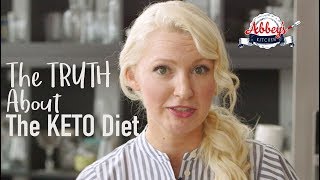The TRUTH About The KETOGENIC Diet | Benefits and Dangers
The TRUTH About The KETOGENIC Diet | Benefits and Dangers

First, what is the keto diet?
The keto diet is a diet that consists of extremely high amounts of fat, low amounts of carbs and moderate amounts of protein. It’s pretty restrictive. It consists of things like meat, cheese, oils, butters, creams and cuts out any kind of carbohydrate based foods like potatoes, rice, pasta, bread, fruit and any kind of starchy vegetable. In other words, it completely removes at least one food group.
The idea behind the keto diet, is that instead of relying on glucose to fuel your body, it breaks down fat into ketone bodies and uses that for energy instead.
Any benefits?
The diet was originally used to treat epileptic seizures in children and the research in that area is very promising. It’s also been shown to potentially treat other neurological disorders such as Parkinson’s, MS, and Alzheimer’s disease.
There is also some evidence that has shown a keto diet may help control blood sugar levels in people with type two diabetes, as well as potentially improve cholesterol levels.
Aside from the therapeutic benefits in clinical settings, the recent fascination of using the keto diet for rapid weight loss is the biggest concern. Any time you cut out one or more major food groups, you’ve got fewer food choices and you’ll eat less.
There’s also a lot of research comparing low carb diets and low fat diets. While low carbers tend to lose weight faster, by about the 1 year mark, that weight loss levels out and there really isn’t any difference between the low carb dieters and the low-fat dieters. The reason you may lose weight quickly, is because glycogen (which stores carbs) is bound up with water, so when you lose your glycogen stores because you’re not eating any carbs, you tend to just lose a lot of water weight. In other words, that rapid weight loss is not so much fat, as it is just a lot of water.
One of the nice things about the keto diet is it tends to reduce our hunger hormone ghrelin. So, a lot of keto dieters report feeling less hungry than they would on another restrictive diet.
But, as with any restrictive diet, Abbey still has some major concerns.
The first concern, is that it is a hard diet to stick to. It has a high dropout rate, because people find it painfully restrictive and hard to stick to. They also report feeling cranky and fatigued after cutting out carbs. Especially at the beginning when your body is not accustomed to using ketone bodies for energy.
Another impact is the loss of muscle mass which is important to boosting our metabolism in the long run. When you eat carbs, you get an insulin response and insulin is like that key to helping that protein get into our muscles to help our muscles grow. Carbs also give you that quick little bout of energy so you can push it in the gym, so you may feel it’s harder to work out when you’re on the keto diet.
Another uncomfortable side effect is constipation. When you cut out a lot of fibre rich grains, fruits and vegetables, you may find yourself getting a little backed up which is never fun…
A huge concern about cutting out any kind of food group is you may be missing out on vital nutrient and minerals. In the case of keto diet that includes: sodium, chloride, potassium, vitamin D and calcium, which are vitally important.
Also keep an eye out on your bloodwork because of the skewed macronutrient distribution of this diet. Research suggests the keto diet may increase the risk of cholesterol, so if you have a preexisting heart condition this may not be the diet for you. As always be sure to speak to your doctor before starting any diet, especially an extreme one like this.
Finally, any kind of restrictive eating pattern may encourage disordered eating behaviours. Abbey believes everything, especially carbs, can be enjoyed in moderation. The best diet for you is a diet that you find most pleasurable and also meets your bodies unique needs.
For more tips on staying healthy, recipes, dieting, and information fit for consumption by foodies everywhere stop by Abbeys blog.
http://www.abbeyskitchen.com
